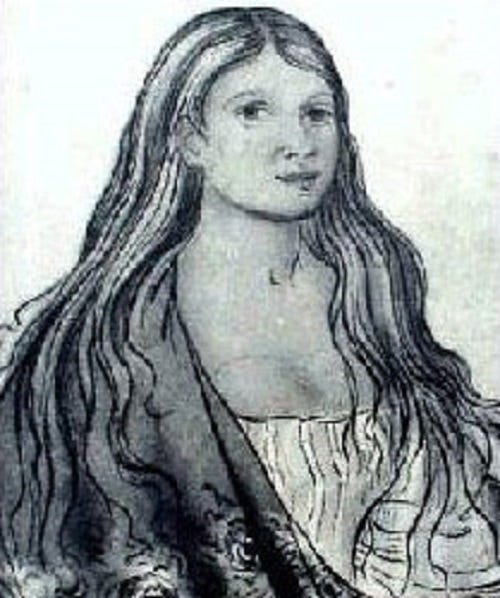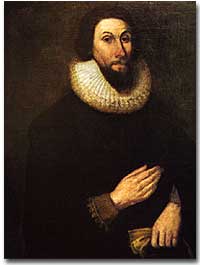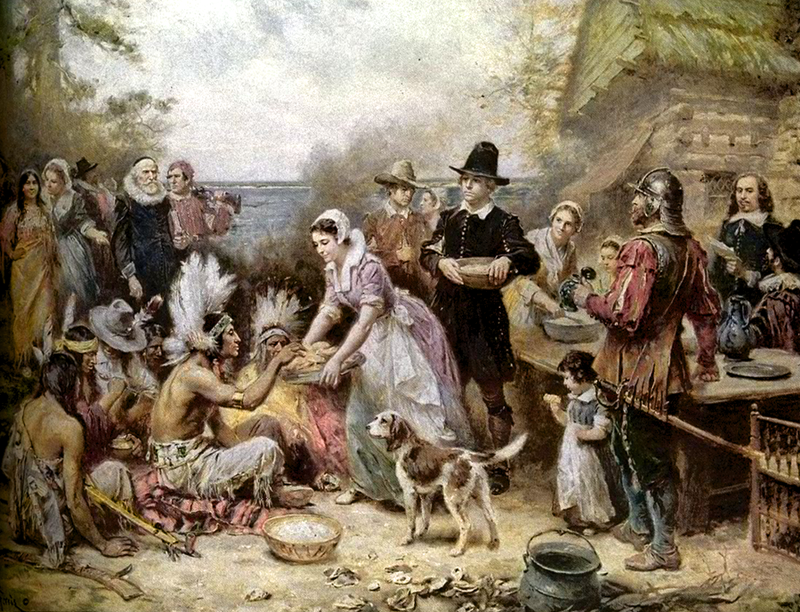The devil in disguise: Natives, puritans and the history of Thanksgiving
For a change, we will be shifting from our usual theme of Indian politics while focusing on some international stuff. A few days from now is Thanksgiving, one of the biggest festivals celebrated in America. Today celebrated as the onset of harvest season, this festival has a story to it. A story that had a happy beginning but unfortunately ended with genocide of the people responsible for this festival of joy and, as its name suggests, gratitude.
The story begins in 1513 with the arrival of Juan ponce de Leon, the first European to reach North America, in present-day Florida. He was a Spanish explorer and the governor of Puerto Rico. After his first warm visit, Juan made another voyage in 1521 to the newly discovered continent with lots of lands. Unlike the first visit, Juan kept Europeanism with him for the second time and tried setting up a colony, which was not received very well by the natives. He was hit by an arrow and later succumbed to his injuries.
Such skirmishes between the Europeans and natives, or as the travellers called them, the Red Indians, were almost unavoidable. For the reason that while Europe was busy colonizing, trading, and exploiting the places it visited, the native Americans believed in subsistence and had little to do with the outside world of greed.
In societies like Aztec, Maya, Cherokee, and Chippewa, people believed that land was a common resource and not something to be owned privately. As they believed, “the great spirit gave it to his ‘children’ to live upon and ‘cultivate’ as far as necessary for its subsistence; and so long as they ‘occupy’ and cultivate it, they have a right to the soil.”
Europeans used to find Red Indians uncivilized as according to them, they did not know how to utilize their lands. To add to this hate was the fact that in these tribal societies women always had a choice, not only to remarry but to indulge in intimate relationships before marriage as well. Women were not only equal to their male counterparts but also held positions, including that of prominent religious leaders.
While the slaves arrived on one end, another settlement was under construction in present-day Massachusetts. Pilgrims started arriving in the 1620s. These were the people seeking salvation in the new world. Out of the group of 100 pilgrims were some odd 35 Puritans. These were highly religious people who believed that ‘the needs of many outweigh the needs of the few of the one’.
Or as John Winthrop said in his speech, the Dreams of a city on Hill, in 1630, “we must be knit together, in this work, as one man. We must entertain each other with brotherly affection. We must be willing to abridge ourselves of our superfluities, for the supply of others’ necessities. We must uphold a familiar commerce together in all meekness, gentleness, patience, and liberality.”
But this was not coming from nowhere. It is noteworthy that the puritans and pilgrims arrived in Massachusetts at the onset of winter. More than half of the community to arrive was wiped off before the arrival of December. It was the natives with their resources and food who saved the poor religious men who had no idea about the lands they were going to settle in.
This act of kindness by natives later led to the pilgrims hosting a feast for the natives as a depiction of the former’s gratitude. This act of appreciating the tribes led by Squanto, popularly known as Tisquantum, the leader of the Patuxet tribe, later came to be known and celebrated as Thanksgiving.
Though puritans claimed to believe in just and equal laws for everyone, later as the colonies were set up, only church members were allowed to hold office. Or again, in the words of John Winthrop, “some must be rich and some poor. Some high and eminent in power, and dignity, others mean and in subjection”, hence, apparently not so equal for everyone.
The truth being told in the words of historian Eric Foner was “ inequality was considered an expression of God’s will and while some liberties applied to all inhabitants, there were separate lists of rights for freemen, women, children, and servants.”
As stated earlier, America has had its own share of a dark history. The achievements of then generals and viceroys were nothing less than today’s ethnic genocides. Spanish religious leader, Bartolome de las Casas, observed in great detail the most violent and inhumane acts carried out by the imperial powers. He observed that the settlers, who established colonies based on gunpowder and military supremacy, used to test their swords on the flesh of Arawaks. Military repression and forced labour eventually led to wiping off some of the largest tribes in less than a decade.
Due to such military activities, both sides lost innumerable men but the real losers were natives. They lost everything from lands to people. While USA celebrates this day of Thanksgiving it is important to ask, where are those who laid the base for this?
It is important to underline such accounts as more and more people among us idealise the west. The glamour of Hollywood and skyscrapers of New York make us go gaga, the real people of those lands are still living in dungeons. Would they not had been kind enough to give refuge to white genocidal machines, present could have been different.



Brilliantly written!! Are there any representations given to the tribes and communities? Please let me know
ReplyDeleteAlso all the horrendous atrocities apart the moment I read Florida I wasn't surprised... that land is cursed!
Insightful
ReplyDeleteInsightful
ReplyDeleteNow this is what I wanted to read! Kudos to the writer for dwelling deep into this topic.
ReplyDeleteVery interesting piece.